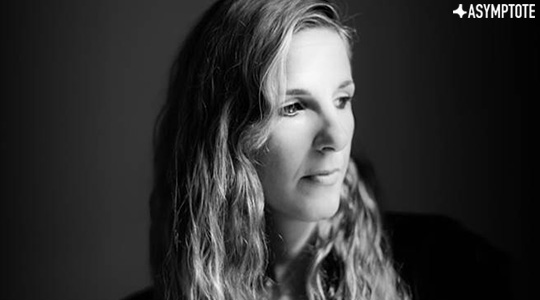Charco Press is an Edinburgh-based publisher dedicated to bringing the best in contemporary Latin American fiction to English-speaking readers. The press seeks out innovative, thought-provoking literature—and compelling stories—and their first titles, released in the summer of 2017, reflect the diversity of voices they are committed to publishing. Over email, Charco’s director, Carolina Orloff, and Asymptote’s Editor-at-Large for Argentina, Sarah Moses, discussed the press’s origins, the wealth of contemporary literature being written in Latin America, and what Charco has in store for 2018.
Sarah Moses (SM): How was Charco Press born?
Carolina Orloff (CO): Charco Press was born from observing a real stagnation when it comes to Latin American literature in the English-speaking world. When you ask an avid reader, what’s the last book they read by a Latin American author, the same names recur: García Márquez, Vargas Llosa, Borges, maybe Bolaño, maybe Isabel Allende. Having experienced first-hand the extraordinary wealth and variety of literature being produced on the other side of the pond, we felt it was time to update the scene and bring some of that talent across for the English-speaking reader to discover and enjoy.
SM: Your first catalogue contains works by five Argentinian authors and next year you’ll publish titles from various Latin American countries. How do you discover new books? How do you decide which ones are right for Charco?
CO: We select authors that are relatively young but who have already established a certain reputation outside the English-speaking world. We select stories that are universal, yet told from a very distinct point of view. We pick voices that stand out from their contemporaries because they have something different to bring to the reader. These are the kinds of books that define the aesthetic evolution of Charco.
SM: Charco is based in Edinburgh, so I’m curious how, if at all, you feel your location affects the titles you choose and also how they’re translated and published.
CO: Undoubtedly, being based in Edinburgh has certain implications in terms of logistics and even politics, but not in regards to the titles we choose nor on the translation or publishing processes. One of the many advantages of being based in Edinburgh, and in Scotland in general, is that the artistic community per se, and even more so the publishing circle, is a lot smaller than in England and in London, which has translated into Charco Press being known in these sectors pretty quickly. We feel incredibly supported by the local independent bookshops and also by the Edinburgh International Book Festival, who have been there from the launch of our very first titles in the summer of 2017.
SM: What have been some of the biggest challenges to starting up a small press dedicated to literature in translation?
CO: Starting a small press is difficult in any context, however being small and independent means that we have total freedom when it comes to making our decisions, from which titles we choose to publish, to which translator to work with, to what the book will look like. One of the biggest challenges we face are the preconceptions of the English-speaking reader as far as translated literature is concerned. Our books get immediately categorized as “translated fiction,” which is true and unavoidable, but Charco Press wants to go beyond that and change this culture. We publish good literature. Our reader should not necessarily come to us because they have an interest in translated fiction, but because they enjoy reading well-crafted stories.
SM: Are you optimistic about the future of literature in translation to English?
CO: Yes, we are. It has been a great pleasure to see the enthusiasm and interest that our project is generating. The feedback we receive at events or through social media is that there is a real thirst out there for exploring new areas of literature. The litmus test is, of course, the reader verdict on the books themselves, and the first reader reviews of our books, just starting to appear now, have been extremely positive. We are very optimistic that gradually the English-speaking reader will venture more and more into exploring literature from all parts of the world, whether in translation or not.
SM: Can you share a few new or forthcoming titles you’re excited about?
CO: We are very excited about our forthcoming titles! 2018 is starting with two extraordinary books: Fireflies, by Luis Sagasti, an indescribable tale of historical characters and the art of narration, and Southerly, a collection of beautifully written short stories by Jorge Consiglio. The year continues with Margarita García Robayo and a unique publication that brings together some of her short stories and a novella. We are very excited to be publishing Brazilian writer Julián Fuks’ A Resistência, which just won the José Saramago Literary Prize and will be translated by the very talented Danny Hahn, and also Renato Cisneros’ La distancia que nos separa, which sold over 35,000 copies in his native Peru alone and has been longlisted for the Prix Médicis. Also coming out next year is Daniel Mella’s El hermano mayor, translated by the brilliant Megan McDowell, and the groundbreaking debut novel La habitación alemana by Carla Maliandi. We have more very exciting titles already confirmed for 2019, but will keep those a secret for now…
Sarah Moses is a writer and translator. Her work has appeared in chapbook form, as well as in various journals, including Brick and TNTR. Sarah divides her time between Toronto and Buenos Aires.
*****
Read More Publisher Interviews:
- Meet the Publisher: Simon Dardick, Co-Publisher of Véhicule Press, on Publishing Translations of Francophone Literature and Social History
- Meet The Publisher: Antares Press’s Margarita Feliciano on Publishing from Spanish, French, and Indigenous Languages
- Meet the Publisher: Seagull Books and the Value of Independence

